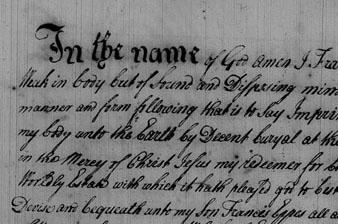 Examining Culture through the Lens of a Will
Examining Culture through the Lens of a Will
Grades/Level: Middle School (7-9), High School (9-12)
Subjects: Social Studies, Language Arts
Time Requirement: 90 minutes Homework: Short expository post-activity writing.
Overview: Very few documents survive that were written from the perspective of enslaved people in Virginia. We learn about their lives through letters, legal documents, plantation accounts, and newspaper stories and advertisements written by white landowners, and through archaeology. In order to understand the history of one group of slaves who lived in central Virginia in the 1700s, we will start by reading the will of a wealthy landowner who considered them, by the laws of the day, to be his property. More broadly, by reading this will we can explore what the will of a wealthy landowner tells us about the culture of the time.
Pre-writing: What is a will? It’s purpose? Its historical value?
Activity: Students will collaborate to establish the contents of the will and discuss the implicit and explicit meanings conveyed in a will.
Post-writing: Students will write a second piece responding to the pre-writing prompt explaining changes in their thinking following the activity.
Learning Objectives:
Using historical documents to examine implicit and explicit information revealed in a legal document in the context of its time.
Collaborating in small groups to establish central facts in a will and then discussing the implications of those facts given the time period.
The lesson:
Ask the students what the purpose of a will is, as they understand it? Compile the ideas and add that the purpose of a will is to preserve/pass on family wealth from one generation to the next in a culturally appropriate way and a way that is legally enforceable.
Ask them to list several items they would include in their own will. Then suggest that these items implicitly reveal cultural importance. What we want to pass on reveals worth and importance in our lives. Ask for volunteers to share what some of their items might reveal about twenty-first century culture.
For example, if someone has listed an original ipod it reveals the stage of technological progress in the way that a pocket watch may have been important in the nineteenth century.
Underscore that a will reveals a person’s wealth in the context of the times as well as what the person values as a legacy.
Transition:
Hand out copies of the Will explaining that this is the will of a wealthy Virginia Landowner in 1733 in the Piedmont area of Virginia.
HOOK: If this document were the only existing document, what could we discover about this man, his family, and the valued material and non-material culture of the time?
First let’s find the facts, the explicit information. What does he want to pass on? To whom does he want to give it?
Allow the students to read through the document to look for major categories.
(Suggested categories: Names and Relationships, Land, Negro slaves, Household items, Farming items, Animals)
Using large pieces of newsprint have groups post their lists in the room.
With partners, match the items to the people who will receive them.
Then, think of three questions you have about the distribution of items to share with the class.
Ask for volunteers with questions and make the list available for all to see. Which ones are the easiest to answer? (Offer questions parenthetically here to help kick start the activity. Which child gets the most? What is the birth order of this group? What is evenly divided? What is disproportionately divided? Which Negroes and what gender are given to whom and what is the message there? Does the will provide information about any of the relationships between the slaves who are listed? How old are the children listed at the time the will is written?
Encourage the students to use the FAQ page and other materials to answer their questions.
Reinforce that although some questions cannot be answered with the will alone, they can be answered with other legal docs. Explicit information is the same. Some can be supported with evidence and some we can never prove conclusively. What is important is that we build a lesson encouraging them to ask questions.
Clearly state that you have now collected facts (explicit information) and are ready to ask questions and draw conclusions about undeclared (implicit) information.
How do you feel about people being seen as property to be passed down in a will? How do you think Eppes and members of his family felt about this practice?
What do the facts suggest about what is valued at the time? Just as we discovered some of our questions about the explicit information couldn’t be answered with the evidence available, some of our questions about the implicit information will not be answered without further research.
Choice: Homework or class work depending on time available.
POST WRITING:
WHAT DOES THE WILL OF A WEALTHY LANDOWNER IN THE PIEMONT AREA OF VIRGINIA TELL US ABOUT THE CULTURE OF THE TIME?
Other Materials:
- Francis Eppes the 4th’s Will annotated and transcribed (download PDF copy)
- Francis Eppes the 4th's original Will (download PDF copy)
- Maps indicating the tidewater, piedmont, and mountain areas of Virginia (download PDF copy)
- Genealogy chart of Eppes family (download PDF copy)
- Records of slaves owned by Thomas Jefferson (download PDF copy)
- Francis Eppes the 5th’s (the son) will annotated and transcribed (download PDF copy)
- Fact Sheet discussing probate documents, primogeniture and entail (download PDF copy)
- Fact Sheet discussing patenting land and conveying land by deed (download PDF copy)
- One page general overview of the context of the historical time in Virginia (download PDF copy)



